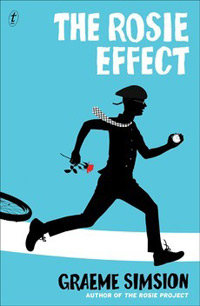Book Review: The Rosie Effect
Graeme Simsion’s Follow-Up to His Best-Selling The Rosie Project
Perhaps a sign of how familiar society has become with Asperger’s syndrome is the success of Australian author Graeme Simsion’s The Rosie Project, whose protagonist exhibits autistic spectrum behaviors. The book was an international best seller with a screenplay optioned. Simsion’s follow-up — The Rosie Effect — is on shelves now and appears to be equally as popular as its predecessor.
Once again the hero — and he might well be called that, given the arduous and perplexing course he must steer through life — is Don Tillman. Picture someone plowing fields (to take his name literally) using a ruler and a T-square, and that would be Don. He and Rosie — procured in The Rosie Project — have married and moved from Australia to New York City, where Don is a professor of genetics at Columbia University, while Rosie scrambles to complete her PhD in psychiatry.

Due to Don’s literal and analytical take on the world, the behavioral and social cues that grease the wheels for most people don’t register with him — life is informational input, analysis of said input, lists of possible meanings of information, problems presented, and a list of possible solutions. So when Rosie announces, “We’re pregnant,” the plural pronoun itself causes Don to “realize that my brain had been assaulted with information that appeared to defy logic ….” (He knows enough biology to know that the “we” part is not possible.)
His first action is to have a complete meltdown. He gives his wife, Rosie, the “time-out” sign; runs to the elevator; ends up in the basement, where he encounters Jerome (a fellow-tenant who has dyed all Don’s underwear purple due to a misuse of the laundry facilities); expresses his displeasure with a martial-arts move; and then walks New York’s logically numbered streets to his friends Sonia and Dave’s apartment, in an effort to unmelt.
From then on, his readiness-for-fatherhood plans lead from one disaster to the next, all requiring secrecies and lies. For example, Don discovers, in what comes to be known as the Playground Incident, that taking videos of young children at a playground does not go over well with mothers or the police.
The open-mouthed silences and hostile reactions that sometimes follow Don’s remarks let the reader know early on how other people see him. From the landlord’s, “We don’t need weirdos, Mr. Tillman,” to his friend Gene’s toast: “To Don … who makes life just a little bit crazier for all of us,” Simsion makes clear that no one misses the fact that Don is “differently wired.” Despite his getting the wrong end of the stick on a regular basis, Don is likable and sympathetic.
Simsion himself does not have Asperger’s but, in his work as a data modeler, has known many a computer scientist who may be. However he knows that world, he’s created a character who is awkward yet endearing and who shows us that the “inability to read others’ emotions” is not the same as the “inability to experience their own.”



